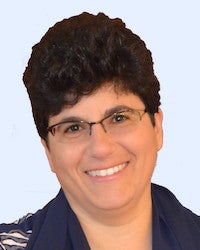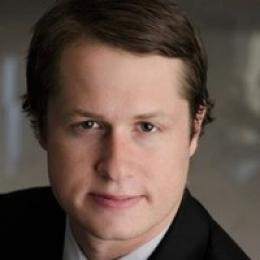
Georgia Albert
INTERNATIONAL CHIEF COMPLIANCE OFFICER AND EMEA COMPLIANCE LEAD
DAVITA
DUBAI, UAE
For the vast majority of Georgia Albert’s professional life, she has been a lawyer. One day in Düsseldorf, Germany, she got a chance to see what it was like to do something else. She slipped into scrubs and followed a doctor into a patient’s room. She got to know the patient and watched the interaction between the patient and caregiver. She fetched water for the patient, and wheeled the dialysis machine into the room when it was needed. Next year she’s hoping to recreate the experience in Saudi Arabia.
Albert, who is the international chief compliance officer and EMEA compliance lead of DaVita, the company best known for kidney care (but offers all kinds of medical services), was rotating through the company’s other departments so she could understand the patient experience. “DaVita has a very strong, intentional culture,” she says. “We don’t have employees, we have teammates. Every single teammate spends a day in one of our clinics to see what it actually means to help patients.”
DaVita is a Fortune 500 company that operates 217 outpatient dialysis centers in 11 countries besides the United States. When kidneys fail, dialysis is the process by which excess water and waste is removed from the bloodstream. The company first came to Albert’s attention when she was working on a risk assessment for DaVita. Even then, she didn’t grasp the depth of its culture. Its CEO is called its mayor; it’s not a company, it’s a village. Even her compliance team has a different name — quest. “As in, being on a quest and finding a fun way there,” Albert explains. The camaraderie appealed to her.
She joined DaVita with a mandate to establish and enforce an anticorruption program. During Albert’s time in private practice, she focused on crises that were already happening. As in-house counsel, she gets to prevent crises from happening in the first place. “You get to think about the business model, and build controls around the touch points,” she says, explaining her compliance philosophy.
For personal reasons Albert is based in Dubai, but she usually works from the road — or, more accurately, the air. Every month, she goes to Amsterdam, where DaVita’s EMEA headquarters are located. She manages about a dozen people around the world. There is typically one compliance worker for each country where the company operates and they are supported by administrative staff in the Denver office, where DaVita’s headquarters are located. Besides the United States, DaVita also operates in Saudi Arabia, Portugal, Poland, Germany, Singapore, Malaysia, China, Taiwan, Singapore, Colombia, and Brazil.
She’s aware of the corruption perception indexes of each country, and stresses that those are good guideposts but no match for firsthand experience in a given country. The industry matters a lot too, she says. A compliance officer should look for things that don’t make business sense. A third party that is involved in a transaction without any discernible job is a red flag. A third party that is paid significantly more than its peers is a red flag. A third party that is paid in an odd way — through a bank account in a tax haven for example — is a red flag.
It’s also important to make connections with coworkers. Albert knows there’s a stereotype of compliance officers as a sort of company police. “Compliance is there to make business happen, while making sure everyone stays out of jail,” Albert relates. She suggests using humor while building relationships with coworkers. “People who run around like Chicken Little claiming the sky is falling aren’t helping anything when they scream every time they see a red flag.”
Albert believes the US Foreign Corrupt Practices Act (FCPA) is making the world a better place because it has changed some corporations approach to business. She points to the infamous Siemens corruption case as an example. In that case, it was alleged that the company ran a cash desk where employees could fill a briefcase with cash. The US Department of Justice has also emphasized that they are going to charge individuals with crimes. That will change the perception that individual bad apples will get away with the crime while the shareholders pay the price, she believes. It will also increase awareness of the law because there will be a face to go with the crime. “Frankly, I think the biggest difference in corruption will happen through geopolitical changes,” she admits. “More stable governments, adherence to the rule of law, the end of kleptocracy, and other changes will need to happen.”
Accidental detours
For a long time, Albert didn’t think she was going to be a lawyer. Her mother, a doctor, raised her in Italy. When she was 16, she attended an international high school in Wales and then matriculated from Yale with a degree in comparative literature. She thought she was going to complete a PhD in literature but she realized that the academic life was “too monastic in some ways.” The amount of solitary effort — with little immediate effect in the real world — irked her. After a couple years in the workforce, she decided to go to law school. It was a revelation. “I remember sitting in contracts and asking myself: ‘Why did no one teach me how contracts worked when I was 16 or 17?’” she reflects.
Her entry into the compliance world was similarly indirect. After she earned her JD from Yale Law School, she clerked for two federal judges. “I knew I wanted to do both district and appellate clerkships because of the difference exposure that you get on a matter,” Albert says. She would have stayed a law clerk forever if she didn’t need to pay off her loans.
At Sidley Austin LLP in Washington, DC, she was first assigned to the anticorruption beat. She didn’t have much of a say in the matter, having just joined the firm following her clerkships. Albert was shocked that she enjoyed working with financial accountants to figure out what they could learn from the numbers. She enjoyed the challenge of figuring out what went wrong and when.
Albert likes developing skills that help her in her mission to root out corruption. She has a passion for language — which comes in handy when managing an international team. Albert makes no claims about her fluency but she has studied French, German, Spanish, Russian, ancient Greek and Latin, and most recently Arabic. As a native Italian speaker, she knew what she was getting into when she joined DaVita, which means “giving life” in Italian. It’s something that the polyglot does not need translated.
Getting to know... Georgia Albert
What is your favorite hobby?
Right now I mostly don’t have a lot of time for hobbies. We love to travel, believe it or not. When I travel for work, I manage to take some time off. My husband and I travel for leisure.
I used to be a semi-serious, not professional, but recreational bike rider. When I lived in California, I used to ride centuries, which are 100-mile bike rides. Before I moved to Dubai, I was living in Washington and I was extremely pleased with the biking infrastructure there. Unfortunately Dubai is not a great place to ride a bike. It’s dangerous and, for six months of the year, it is way too hot to exercise outside.
Where would you go for your dream vacation?
The answer to that question is expected to be some amazing beach place. I don’t do well at the beach because I get bored, and when I get bored the computer comes out. I think one of the most beautiful places I have been is Iceland. It has incredible colors, in this foreign, almost lunar landscape. It has black sand beaches and icebergs and just gorgeous orange and green colors.
I did a road trip there with a close friend and I still have the pictures to show for it. Otherwise, I like anything that combines culture, nature, and being on the move. If I sit, what used to be the BlackBerry and is now the iPhone comes out and that defeats the purpose of a vacation.




